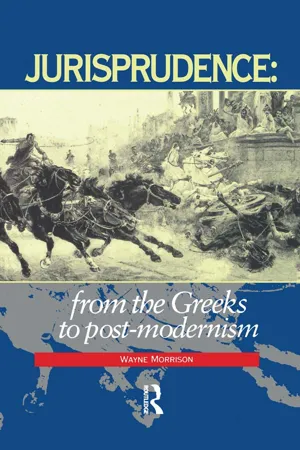
- 600 pages
- English
- ePUB (mobile friendly)
- Available on iOS & Android
About this book
This challenging book on jurisprudence begins by posing questions in the post-modern context,and then seeks to bridge the gap between our traditions and contemporary situation.
It offers a narrative encompassing the birth of western philosophy in the Greeks and moves through medieval Christendom, Hobbes, the defence of the common law with David Hume, the beginnings of utilitarianism in Adam Smith, Bentham and John Stuart Mill, the hope for enlightenment with Kant, Rousseau, Hegel and Marx, onto the more pessimistic warnings of Weber and Nietzsche.
It defends the work of Austin against the reductionism of HLA Hart, analyses the period of high modernity in the writings of Kelsen, Hart and Fuller, and compares the different approaches to justice of Rawls and Nozick.
The liberal defence of legality in Ronald Dworkin is contrasted with the more disillusioned accounts of the critical legal studies movement and the personalised accounts of prominent feminist writers.
Frequently asked questions
- Essential is ideal for learners and professionals who enjoy exploring a wide range of subjects. Access the Essential Library with 800,000+ trusted titles and best-sellers across business, personal growth, and the humanities. Includes unlimited reading time and Standard Read Aloud voice.
- Complete: Perfect for advanced learners and researchers needing full, unrestricted access. Unlock 1.4M+ books across hundreds of subjects, including academic and specialized titles. The Complete Plan also includes advanced features like Premium Read Aloud and Research Assistant.
Please note we cannot support devices running on iOS 13 and Android 7 or earlier. Learn more about using the app.
Information
Table of contents
- Cover
- Haft Title
- Title Page
- Copyright Page
- Table of Contents
- Table of Contents
- 1 The Problem of Jurisprudence, or Telling the Truth of Law: an entry into recurring questions?
- 2 Origins: Classical Greece and the idea of Natural Law
- 3 The Laws Of Nature, Man’s Power and God: the synthesis of mediaeval Christendom
- 4 Thomas Hobbes and the Origins of the Imperative Theory of Law: or mana transformed into earthly power
- 5 David Hume — Defender of Experience and Tradition Against the Claims of Reason to Guide Modernity
- 6 Immanuel Kant and the Promotion of a Critical Rational Modernity
- 7 From Rousseau to Hegel: the birth of the expressive tradition of law and the dream of Law’s Ethical Life
- 8 Adam Smith, Jeremy Bentham and John Stuart Mill: the early development of a utilitarian foundation for law
- 9 John Austin and the Misunderstood Birth of Legal Positivism
- 10 Karl Marx and the Marxist Heritage for Understanding Law and Society
- 11 Weber, Nietzsche And The Holocaust: towards the disenchantment of modernity
- 12 The Pure Theory of Hans Kelsen
- 13 The High Point of Legal Positivism: HLA Hart and the theory of law as a self-referring system of rules
- 14 Liberalism and the Idea of the Just Society in Late Modernity: a reading of Kelsen, Fuller, Rawls, Nozick and communitarian critics
- 15 Ronald Dworkin and the Struggle Against Disenchantment: or law within the interpretative ethics of liberal jurisprudence
- 16 Scepticism, Suspicion and the Critical Legal Studies Movement
- 17 Understanding Feminist Jurisprudence
- 18 Concluding Remarks: or reflections on the temptations for jurisprudence in post-modernity
- Bibliography
- Index